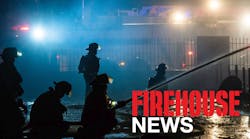We all remember that the original goal was to get $1 billion per year appropriated for the FIRE Act and that Congress authorized $900 million annually. The first year appropriation was $100 million, which was a good start. The second year appropriation rose to $360 million, and the most recent two years of appropriations were $750 million each year. Yet the appropriations each year have fallen way short of the amount of grants requested – almost $3 billion. So, the FIRE Act is still not able to fund two-thirds of the grants submitted for consideration.
Formally known as the Assistance to Firefighters Grant Program, the FIRE Act is not perfect, but it has been the most significant federal financial contribution to the nation’s fire departments in our history. It has made a difference, a positive difference throughout the country. So, why am I confused?
As I previously said, there is significant support in Congress for the FIRE Act program. However, elsewhere at the federal level, I’m not sure I can say the same with any degree of confidence. Following are a few of the things that are concerning:
- The President’s budget proposal for next year reduces the FIRE Act funding to $500 million, a cut of one-third from the current appropriation. If Congress adhered to the President’s budget, funding for fire prevention and public education grants, as well as health and wellness and other important areas of grants, would be eliminated. Is this wise public policy?
- I attended a White House briefing on May 5. One of the speakers was Sue Mencer, director of the Office for Domestic Preparedness (ODP) within the Department of Homeland Security (DHS). ODP now manages the FIRE Act program. In her remarks, Mencer made it clear that ODP’s mission is terrorism, and specifically, weapons of mass destruction. Having heard her, I question what this means for the future of the FIRE Act.
Many of us are suspicious of ODP’s agenda. If given the opportunity, would Mencer transition the FIRE Act to a terrorism-focused program and attempt to combine those funds with other ODP grant funds? Such a scenario would be consistent with the President’s budget proposal for fiscal year 2005, which proposes a greater emphasis on the program for terrorism preparedness. She said nothing at the briefing to ease our minds or eliminate our concerns.
- It isn’t hard to see that the U.S. Fire Administration (USFA) is positioned within DHS in a way that minimizes its influence and authority. Congress wants a strong USFA, but the jury is still out as to whether DHS will ever allow the U.S. Fire Administrator to fill a prominent senior executive role in that organization. The fact is that the USFA’s role in DHS is minimized. The USFA is positioned poorly within DHS, and if it stays that way, the USFA will become a shadow of its former self, and that could include the National Fire Academy.
The irony in this is that the U.S. Fire Administrator, R. David Paulison, was honored at the National Fire and Emergency Services Dinner in May for his leadership in addressing the needs of the fire service at the national level. Does DHS see Paulison in the same light as we in the fire service do? As a former fire chief who served as incident commander at two major disasters – Hurricane Andrew and the ValuJet crash – he understands our needs better than anyone within the administration. One can’t help but wonder whether the administration fully appreciates his talents in understanding the role and readiness of the fire service as it relates to large-scale disasters.
The FIRE Act was never intended to be solely dedicated to terrorism. It was passed by Congress and signed by the President to fund basic needs relating to fire prevention, public education, equipment, apparatus, training, safety, etc. DHS Secretary Tom Ridge and his deputy, Mike Brown, assure us that the Fire Act will continue to be managed and administered as it was intended. Congress is writing safeguards into the FIRE Act Reauthorization Bill to direct the way the grant program will be administered and to protect it. Both the House and Senate versions of the FIRE Act Reauthorization Bill restore funding for prevention, public education, wellness/fitness grants, etc. Should the language to restore the prevention and education provisions and preserve the original intent of the program prevail in Congress, the administration should declare a truce with the fire service and issue an advisory notice to all agency heads that the FIRE Act is off limits.
Finally, reverting back to Mencer’s comments about ODP’s primary mission, we in the fire service have been urging both the administration and Congress to address our challenges from an all-hazards perspective, not exclusively weapons of mass destruction. When the director of ODP, who has control of virtually every federal grant dollar for homeland security, tells the fire service that ODP’s mission is primarily directed at weapons of mass destruction, it makes you wonder who is counseling her. I doubt that it’s USFA officials, because they know that terrorism takes on many forms and requires training and equipment that starts at the baseline level of response, which the FIRE Act addresses.
Maybe I’m being a little paranoid – and maybe not. Maybe we’re all imagining this confusion and it’s really just the result of miscommunication – and maybe not. The fire service needs to be more watchful than ever before. Individually, we must ensure that the President and our members of the House and Senate know how important the USFA, the National Fire Academy and the FIRE Act are to us and to the nation.
The fire service is the primary protector of the economic infrastructure of the United States. If we aren’t adequately supported by our elected officials and federal agencies, we cannot protect lives, the economy or property in times of need. If we can’t respond to the day-to-day calls for service adequately, we can’t respond effectively to acts of terrorism or disasters either.
We better watch what’s going on in Washington, DC. We owe it to the public we serve and to each other as well. Our supporters need for us to speak out in a responsible, productive and coordinated way so they can be of help to us. Please do so. I think you can see why I’m confused.
Dennis Compton will present “Investing in the Fire Service: Developing Future Fire Officers” at Firehouse Expo 2004 in Baltimore, July 13-18.Dennis Compton, a Firehouse® contributing editor, is a well-known speaker and the author of several books including the When In Doubt, Lead! series, Mental Aspects of Performance For Firefighters And Fire Officers, as well as many other articles and publications. He is also the co-editor of the current edition of the ICMA’s textbook Managing Fire and Rescue Services. He serves as a national advocate and executive advisor for fire service and emergency management issues and organizations. Compton served as the fire chief in Mesa, AZ, for five years and as assistant fire chief in the Phoenix Fire Department, where he served for 27 years. He is past chair of the executive board of the International Fire Service Training Association (IFSTA), past chair of the Congressional Fire Services Institute’s National Advisory Committee, and serves on the board of directors for the Home Safety Council (HSC).




